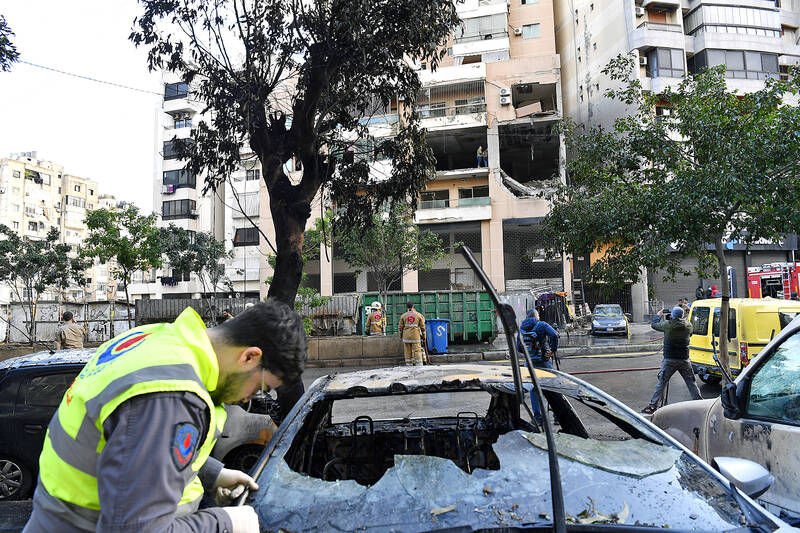Israel yesterday kept bombing Gaza after the army warned it is ready for “any scenario” following a drone strike in Lebanon that killed the deputy leader of the Palestinian militant group Hamas, stoking fears of a regional escalation.
Although Israel did not claim the Beirut assassination on Tuesday evening, it was widely assumed to be behind the killing of Saleh al-Aruri, 57, the political No. 2 of Hamas and one of the founders of the Islamist group’s military wing.
After al-Aruri and six other militants were killed in the attack, Israeli army spokesman Daniel Hagari said the military was in a “very high state of readiness in all arenas” and “highly prepared for any scenario.”

Photo: EPA-EFE
The Israeli armed forces again bombed Gaza targets overnight, including in the crowded southern city of Rafah where eyewitnesses said survivors flocked to Mohammed Yousef al-Najjar Hospital to mourn the dead, including a child.
Israel has vowed to destroy Hamas after the militant group’s bloody Oct. 7 attack and has launched a relentless military campaign in Gaza that has claimed more than 22,000 lives, the territory’s health ministry says.
Israel has labeled Hamas’ Gaza leader Yahya Sinwar a “dead man walking” and vowed to also kill other commanders of the Islamist movement considered a “terrorist” group by the US and the EU.
Amid the nearly three-month-old war, Israel has traded almost daily cross-border fire with the Lebanese armed group Hezbollah, an Iranian-backed ally of Hamas, while so far avoiding a full-scale war.
Maha Yahya, director of the Malcolm H. Kerr Carnegie Middle East Center think tank, said that although al-Aruri’s killing was “a significant escalation,” Hezbollah might not get involved.
“I don’t think Hezbollah will be willing to drag Lebanon into a major conflict at this particular moment and time given the situation regionally,” Yahya said.
Violence has also flared with other militant groups in the Iran-led “Axis of Resistance,” including in Syria, Iraq and Yemen, where Houthi rebels have attacked cargo vessels in the Red Sea, a key shipping lane for world trade.
Iranian Minister of Foreign Affairs Hossein Amir-Abdollahian condemned the “cowardly” Beirut strike and said it proved that Israel “has not achieved any of its goals after weeks of war crimes, genocide and destruction in Gaza and the West Bank of Palestine, despite the direct support of the White House.”
Hezbollah vowed that al-Aruri’s killing would not go unpunished, labeling it “a serious assault on Lebanon ... and a dangerous development.”
Lebanese Prime Minister Najib Mikati charged that the killing “aims to draw Lebanon” deeper into the war, while French President Emmanuel Macron urged Israel to “avoid any escalatory attitude, particularly in Lebanon.”

A magnitude 7.0 earthquake struck off Yilan at 11:05pm yesterday, the Central Weather Administration (CWA) said. The epicenter was located at sea, about 32.3km east of Yilan County Hall, at a depth of 72.8km, CWA data showed There were no immediate reports of damage. The intensity of the quake, which gauges the actual effect of a seismic event, measured 4 in Yilan County area on Taiwan’s seven-tier intensity scale, the data showed. It measured 4 in other parts of eastern, northern and central Taiwan as well as Tainan, and 3 in Kaohsiung and Pingtung County, and 2 in Lienchiang and Penghu counties and 1

FOREIGN INTERFERENCE: Beijing would likely intensify public opinion warfare in next year’s local elections to prevent Lai from getting re-elected, the ‘Yomiuri Shimbun’ said Internal documents from a Chinese artificial intelligence (AI) company indicated that China has been using the technology to intervene in foreign elections, including propaganda targeting Taiwan’s local elections next year and presidential elections in 2028, a Japanese newspaper reported yesterday. The Institute of National Security of Vanderbilt University obtained nearly 400 pages of documents from GoLaxy, a company with ties to the Chinese government, and found evidence that it had apparently deployed sophisticated, AI-driven propaganda campaigns in Hong Kong and Taiwan to shape public opinion, the Yomiuri Shimbun reported. GoLaxy provides insights, situation analysis and public opinion-shaping technology by conducting network surveillance

‘POLITICAL GAME’: DPP lawmakers said the motion would not meet the legislative threshold needed, and accused the KMT and the TPP of trivializing the Constitution The Legislative Yuan yesterday approved a motion to initiate impeachment proceedings against President William Lai (賴清德), saying he had undermined Taiwan’s constitutional order and democracy. The motion was approved 61-50 by lawmakers from the main opposition Chinese Nationalist Party (KMT) and the smaller Taiwan People’s Party (TPP), who together hold a legislative majority. Under the motion, a roll call vote for impeachment would be held on May 19 next year, after various hearings are held and Lai is given the chance to defend himself. The move came after Lai on Monday last week did not promulgate an amendment passed by the legislature that

Taiwan is gearing up to celebrate the New Year at events across the country, headlined by the annual countdown and Taipei 101 fireworks display at midnight. Many of the events are to be livesteamed online. See below for lineups and links: Taipei Taipei’s New Year’s Party 2026 is to begin at 7pm and run until 1am, with the theme “Sailing to the Future.” South Korean girl group KARA is headlining the concert at Taipei City Hall Plaza, with additional performances by Amber An (安心亞), Nick Chou (周湯豪), hip-hop trio Nine One One (玖壹壹), Bii (畢書盡), girl group Genblue (幻藍小熊) and more. The festivities are to